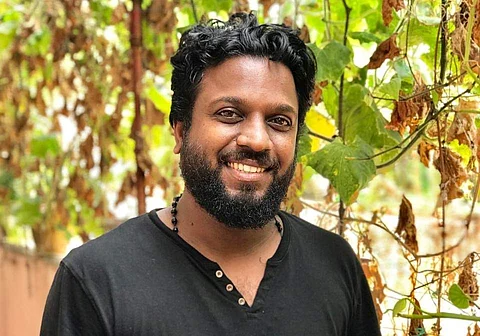

Kiran Das has been part of the industry for over a decade but his work has not been discussed enough. He is best known for editing the National award-winning Thondimuthalum Driksakshiyum and the State award-winning Joseph. His latest work, Ishq, has opened to majorly positive reviews.
Kiran calls himself a self-taught editor. He says he didn’t learn to edit from a film school but from films, echoing Quentin Tarantino. “I did it by watching and learning,” he says. “It was my passion for cinema and editing that drew him to the job.”
According to Kiran, learning to edit is not so difficult. “You can learn film editing in an hour, but then you also need to practice a lot. It takes a lot of patience, having conversations, and learning about new formats and tools. You have to constantly update yourself. I’ve been learning for 14 years,” says Kiran, who began his career at an editing studio doing minor work like correcting small errors, adding graphics and company logos to already edited footage.
Before he joined as the principal editor of Thondimuthalum Driksakshiyum, Kiran worked on Dileesh Pothan’s early work, which included short films, ads, music videos, and documentaries. He also learned a lot while assisting editor V Sajan on the Dileesh Nair directorial Tamaar Padar.
“I asked Dileesh Pothan why he couldn’t get me as the editor of his first film and he told me he will call me for his second film because he will have the freedom to call whoever he wants the second time,” he laughs. Kiran is good friends with Saiju Sreedharan, who edited Maheshinte... and Kumbalangi....
Kiran came on board the film 15 days after the shoot of Ishq began. “I’m normally present during the pre-production or script reading phase of a film. For Thondimuthalum, I knew everything about it and its evolution because Dileesh Pothan had been working on the material for years. It was not the case with Ishq. But as the film was shot really well, I didn’t find it a challenge.”
On his editing approach, Kiran thinks it’s best to look at the overall film instead of individual scenes or shots.”Sometimes you may have to keep the pacing in the first half a little slow to make the second half work. You can increase the intensity in the latter portions that way. A mass film, however, requires a different method of editing. There is not much of a risk involved there. We can entertain the viewers easily. But in a story-driven film like Ishq or Thondimuthalum, there should be necessary detailing that needs to be established first, which naturally takes some time. In Ishq, Shane and Shine were too good that there were times when I wasn't able to cut the length of their scenes,” says Kiran.
Though Ishq was initially written for Fahadh Faasil, Kiran feels that Shane has done such a fabulous job that he no longer imagines Fahadh in the role. “Every actor has their own strengths. Any good performer can make a role like this work.”
As cinematographer Ansarsha had shot the necessary footage with all possible angles, Kiran found it easier to work with it. “Even Rajeev Ravi used to work the same way in Thondimuthalum... He did lengthy shots, so as to give us a lot of options. This gives the editor the power to tweak and mould the footage in the best possible way.”
So what tips would he like to give a first-time editor? “Watch lots of films and familiarise yourself with different filmmaking styles to get an idea of the visual grammar employed by different filmmakers.”
Kiran is presently working on the Soubin Shahir film Ambili, directed by Guppy-fame John Paul George. He has also assisted editor B Ajithkumar (who made his directorial debut with Eeda) on Geethu Mohandas’ Moothon starring Nivin Pauly.